- Home
- Haruki Murakami
Norwegian Wood Vol 1. Page 2
Norwegian Wood Vol 1. Read online
Page 2
The dormitory was located on a hill overlooking the city. The grounds were extensive and surrounded by a high concrete wall. On entering the gate, you were confronted with a massive zelkova tree. It must have been at least one hundred and fifty years old. If you stood at its foot and looked up, you couldn’t see the sky for the leaves.
A concrete path skirted the giant zelkova, then went straight across a courtyard. On either side of the courtyard stood two parallel three-story concrete buildings. From their size and the number of windows, they looked either like prisons remodeled into apartments or apartments remodeled into prisons. Either way, there was nothing the least bit unclean or dark about their appearance. A radio might be heard through a wide-open window, and in every room hung curtains of the same cream color, a shade least susceptible to fading.
Straight ahead along the path was the two-story main building. On the ground floor were the dining hall and baths, and on the second a lecture hall, several meeting rooms, and even a guest room that served no appreciable function. Next to the main building stood a third dorm, also three stories high. The courtyard was large, and sprinklers gleamed in the sun as they whirled about in the middle of the green turf. Behind the main building were a baseball/soccer field and six tennis courts. Everything you could ask for.
The only real problem with the dorm was that there was something fundamentally suspect about the place. It was run by some nebulous foundation that had sprung up around an extreme right-wing figure, so that the management policy—the little that met my eye, of course—came out rather warped. You could figure out as much by just reading the welcoming pamphlet and house rules. “Striving to cultivate persons of benefit to the state through strengthening the mainstay of education.” This was the Founding Spirit, generously supported through the private contributions of numerous like-minded financial leaders who subscribed to this Spirit—so ran the official line, but behind the scenes it was all very murky. Nobody knew anything for certain. Some said it was all a tax-dodge or a gimmick to buy good press, while others held that setting up the dorm had been a ploy to get hold of prime real estate. No, there had to be something even deeper to it, said another theory, which had it that the Founder’s Grand Plan was to rear a covert faction of former dormmates in various financial sectors. Indeed, the dormitory did function as a kind of elite club. I never knew the details, but several times a month there would be study meetings with the Founder, and so long as you were a member of this you had no problem finding employment. I had no way of telling which theory held the most water, but they all recognized “something fishy” about the place.
In any case, for two years, from the spring of 1968 to the spring of 1970, I lived at this slightly questionable dormitory. I couldn’t tell you why I spent two whole years in such a dubious place, but at least on the everyday level left-wing or right-wing, hypocritical-good or hypocritical-bad, didn’t make much difference.
Dorm days commenced with the glorious raising of the national flag. With the national anthem playing, naturally. No separating the national anthem from a flag-raising any more than you could separate the sports news from rally music. The flagstaff was situated smack in the middle of the courtyard in full view of every dorm window.
Supervision of the raising of the flag fell to the supervisor of the East Dorm (the building I lived in). A tall, sharp-eyed man of about sixty with bristle-hard hair flecked with gray and a long scar extending down his ruddy, sunburned neck. Reputedly a graduate of Nakano Military Academy, but again this was unverifiable. By his side, a student-cum-assistant attended to the flag-raising. Nobody knew anything about this student. Crew-cut, always in uniform. His name and what room he lived in were likewise unknown. I never saw him once in the dining hall or the baths. Was he even a student? Well, he was in uniform so he might well have been. What else could we think? Next to Mr. Nakano Academy, he looked positively short, pale, and pudgy. As unseemly a pair as ever raised a Rising Sun at six A.M. in the middle of a courtyard.
When I first entered the dormitory, I’d make an effort to get up at six just to take in this curious spectacle of patriotic pomp. At six A.M. prompt, almost simultaneously with the playing of the anthem on the radio, these two would make their appearance in the courtyard. Kid Uniform in uniform, of course, and black leather shoes. Mr. Nakano Academy in a windbreaker and white running shoes. Kid Uniform would be carrying a shallow paulownia-wood case, Mr. Nakano Academy a portable Sony tape recorder. Mr. Nakano Academy sets the tape recorder down at the foot of the flagstaff. Kid Uniform opens the case. Inside the case is a neatly folded flag. Kid Uniform holds out the flag to Mr. Nakano Academy with all due ceremony. Mr. Nakano Academy attaches the flag to the rope. Kid Uniform switches on the tape recorder.
The national anthem.
Flag ascends.
At “Yon pebbled shores,” the flag is halfway up the pole. By “reigns eternal,” it’s up as far as it can go. Then the two of them snap to “Atten—shun!” and look straight up at the flag. Quite a sight if the day’s clear and the wind’s blowing at a fair clip.
The evening flag-lowering followed the same regimented procedures, albeit in reverse. Flag glides down the pole and into paulownia-wood case. The flag does not fly at night.
Just why it was necessary to lower the flag at night, I had no idea. The state still exists at night. Many people are still at work—tracklayers and taxi drivers and bar hostesses and late-shift firemen and nightwatchmen. It seems pretty unfair to me that they can’t enjoy the sovereign protection of the state, but perhaps it really doesn’t matter all that much. Probably no one pays the least heed to these things. Probably no one but me. And even I don’t hit upon such ideas unless something prompts me. Nor do I ever pursue the question to any extent.
As a rule, dorm room allocations put freshmen and sophomores two to a room, and juniors and seniors one to a room. The double rooms were six tatami mats in size and rather long and narrow, with an aluminum-framed window in the far wall and two sets of desk-and-chair facing each other by the window. To the left of the door, a steel bunk bed. Aside from that, there were two lockers, a small coffee table, and some built-in shelves. Hardly an inspiring space no matter how favorably you looked at it. The shelves of most rooms were jammed with transistor radios and hair driers, electric thermos bottles and hot plates, jars of instant coffee, tea bags, and sugar cubes, maybe a pan for preparing instant noodles and some rudimentary tableware. On the plaster walls there’d be a pin-up from Heibon Punch or a porno movie poster ripped off from somewhere. One joker even pinned up a photo of pigs in coitus, but that was an exception. The walls of most rooms were covered with photographs of nude women or young girl singers and actresses. And the bookshelves over the desks would have your normal array of textbooks, dictionaries, and novels.
With only male occupants, the rooms were almost always a horrible mess. Moldy orange peel fused to the bottoms of wastepaper baskets, four inches of cigarette butts in the tin cans used as ashtrays, which were doused with coffee or beer if they started to smoke, causing a pretty disgusting smell. Dishes dull with grime, all sorts of useless doo-dads stuck on walls wherever you turned, floors littered with instant noodle packets and empty beer bottles and lids from who-knows-what. It never occurred to anyone to take a dustpan and brush to the clutter. Come a breeze and clouds of dust would billow up from the floor. That and a stale odor pervaded every room. Each room had a slightly different smell, although its components were invariably identical—sweat and body odors and trash. Everyone just tossed their dirty clothes under their beds, and there wasn’t a single soul who aired his bedding with any regularity, so the sheets and covers were hopelessly stained with perspiration. Even today I find it strange that no fatal contagious disease ever broke out in that mess.
Compared to those rooms, mine was as pristine as a morgue. Not one speck of rubbish on the floor, not one smudge on the window. Bedding aired once a week, pencils neatly arranged in pencil stands, even the curtains washed once a month
. My roommate was pathologically tidy. I told the others that the guy “even washes the curtains,” but no one believed me. Nobody ever dreamed curtains were anything you had to wash. They all thought they were something that just hung on the windows. Everyone had him marked as a psycho. From which point on they started calling him “Nazi” or “Kamikaze.”
In our room there wasn’t even a pin-up on the wall. Instead, we had a photo of a canal in Amsterdam. When I put up a nude photo, all he said was, “You know, Watanabe, I don’t really go for that kind of thing.” Whereupon he took it down and put up the canal photo in its place. Not that I was particularly set on having a girlie photo on the wall, so I let it go at that. Anytime anyone visited the room, they’d take one look at the canal photo and say, “What the hell’s that?” And I’d say, “Kamikaze looks at it when he masturbates.” I meant it as a joke, but everyone seemed to take it totally deadpan. So deadpan, in fact, that after a while I started to take it seriously myself.
Everyone sympathized with me having to room with Kamikaze, but I was never much put out by the experience. As long as I kept my things in order, he never interfered, so I probably had an easy time of it. He did all the cleaning. Laundering the bedding was likewise his doing. He even took care of the garbage. After three solid days without bathing, he’d inform me I’d better take a bath, and he’d tell me when I needed to go to the barber or trim my nose hairs. The only bother was that he’d fumigate the entire room with insect spray at the mere sight of a bug, at which time I’d retire to the chaos of a neighboring room.
Kamikaze was a geography major at a national university.
“I study m-m-maps,” he’d stammered out to me at our first meeting.
“You like maps, eh?” I asked.
“Uh-huh. When I graduate, I’m going to enter the National Geodetic Institute and make m-m-maps.”
Amazing variety of people in this world with all sorts of aspirations and life-goals. Once again, I had to hand it to humanity. It was one of the very first things to impress me on arriving in Tokyo. To be sure, we’d all be in a fix if there weren’t at least a few people—no need for very many, mind you— burning with an interest in map-making. Still it did strike me as odd that someone who stuttered every time he said the word “map” would want to enter the Geodetic Institute. Other words might or might not cause him to stutter, but when “map” came up it was a hundred-percent certainty.
“And what’s y-your major?” he asked.
“Theater,” I answered.
“By theater, do you mean acting?”
“No, not exactly. We read plays, study them. Racine and Ionesco and Shakespeare and…you know.”
No, he didn’t know. Other than Shakespeare, that is. Hardly surprising. I’d scarcely heard of them myself. It was just what was written in the course description.
“But in any case, that’s what you like, is it?” he asked.
“Not especially,” I said.
This response puzzled him. And when he was puzzled, his stutter got worse. I felt as if I’d done something wrong.
“Anything was fine with me,” I explained. “Ethnology or Far Eastern history would’ve done as well. I just happened to feel like theater at the time, that’s all.” But, of course, that was not something he could accept.
“I don’t get it,” he said with a real I-don’t-get-it look on his face. “M-Me, I like m-m-maps, that’s why I study m-m-m-maps. For that reason, I came all this way to enter a Tokyo university and have my folks send me m-money. But you, saying it’s not like that for you…”
His was the proper argument, so I gave up trying to explain. Thereafter we drew matches to decide who got which bunk. He got the top, I the bottom.
He was always in white shirt, black slacks, and a navy sweater. Crew-cut, tall, high-cheekboned. And he always wore his uniform top to school. Shoes and satchel gloss-black. To all appearances, your right-wing student. Which is why everyone insisted on calling him “Kamikaze,” whereas in fact he was one hundred percent uninterested in politics. He always wore the same thing simply because he couldn’t be bothered with choosing clothes. What interested him were shifts in the shoreline or the completion of a new railway tunnel—things of that nature. Bring up some such subject and you’d have him talking a stuttering streak, one hour, two hours on end, until finally you’d run out on him or fall asleep.
He’d get up every morning at six to the national anthem “reveille,” so at least no one could say that the self-righteous flag-raising ceremony was totally useless. Donning his uniform, he’d head for the washroom to wash his face. He’d take such ages doing it I was almost sure he had to be taking out his teeth and brushing them one by one. Back in the room, he’d give his towel the necessary couple of snaps to take the wrinkles out and drape it over the radiator to dry, then he’d return his toothbrush and soap to the shelf. Next, it was on with the radio for exercise time.
I’d generally stay up late reading and would be dead to the world until maybe eight, often sleeping straight through his rise-and-shine bustle and radio exercises. Even so, he’d always wake me when he got to his jumps. No way I wouldn’t be woken up. With each jump—quite high jumps at that—the vibrations were enough to jolt the mattress up and down. For three days I put up with it—communal living demands a certain degree of patience, after all, but by the fourth day I decided I wasn’t going to take it any longer.
“Forgive me, but would you mind maybe doing your exercises on the roof or somewhere?” I snapped. “You wake me up doing them.”
“But it’s six-thirty already.”
“I know that. Six-thirty? Six-thirty for me is still bedtime. I’m sure I can’t explain to you why, but that’s the way it is.”
“Out of the question. If I do them on the roof, the people on the third floor’ll complain. Here at least there’s only a storeroom underneath, so no one should mind.”
“Well, how about in the courtyard, then? On the lawn.”
“That’s no good either. M-My radio’s not a transistor, so I can’t use it without an outlet and I need music to do my exercises.”
To be sure, his radio was a beaut of an old model, with cord, while mine was a FM-only transistor job, good for nothing but music stations. Just great, I thought.
“Okay, then, one concession,” I said. “You can do your radio exercises, but just hold off with those jumps. They make such a racket. How’s about that?”
“The j-jumps?” he queried back, incredulous. “What d’you mean, ‘jumps’?”
“You know, the jumps. Like in jumps. Bounce, bounce, up and down?”
“There’s nothing like that.”
I began to get a headache. I’d have thrown in the towel on the whole thing, but I figured, hell, I’d gone and opened my mouth, I might as well set the record straight. So I got up and hummed the first tune of the Japan Broadcasting Corporation’s Radio Exercises, jumping up and down on the floor the whole while.
“Look, like this. You do have this part, right?” “Well, I g-guess so, now that you m-mention it. I just n-never noticed.”
“Like I was saying,” said I, plopping back down on my bed, “I’d appreciate it if you’d just cut out that section. Everything else I can handle. Just quit with the jumps and let me sleep in peace.”
“Nothing doing,” he retorted. “I can’t just leave out one thing. I’ve been doing these exercises each and every morning for ten years now, and once I start, the whole thing just comes out autom-m-matically. If I leave one thing out, everything gets thrown out of k-kilter.”
I couldn’t bring myself to say another word. What was there to say? I suppose the fastest way of dealing with the problem would have been to chuck his blasted radio out the window while he wasn’t around, but that would have been asking for trouble. Kamikaze was the kind of guy who takes the utmost care of his possessions. Yet seeing me sitting there disconsolately on my bed, at a loss for words, what could he do but smile and offer me the supreme consolation?
“W-Watanabe, you know we really ought to think of getting up and exercising together.” So saying, he headed off for his breakfast.
*
When I told Naoko about Kamikaze and his radio exercises, she just giggled. I hadn’t meant it to be funny, but in the end I found myself laughing, too. It’d been ages since I’d seen her laugh, even if it lasted only for that one brief instant.
Naoko and I got off the train at Yotsuya and walked along the embankment above the tracks toward Ichigaya. It was a Sunday afternoon in mid-May. The intermittent showers since dawn had completely let up by noon, and even the dismal low rain clouds had been driven off by winds from the south. The cherry leaves tossed about in the breeze, a brilliant green glistening in the sunshine. It already felt like early summer. Passers-by had all taken off their sweaters and jackets, throwing them over their shoulders or clamping them under their arms. Everyone seemed so happy there under the warm Sunday afternoon sunlight. In the tennis courts across from the embankment, young men had stripped off their shirts and were swinging their rackets in their shorts. Two Catholic sisters sat side by side on a bench, all wrapped up in their winter habits as if the summer sun had failed to touch their sphere, and yet they, too, seemed quite satisfied, enjoying a fine chat.
After walking fifteen minutes my back was all covered with sweat, so I peeled off my thick cotton shirt, leaving me in my T-shirt. She rolled up the sleeves of her light gray sweatshirt, faded nicely from many washings. I couldn’t be sure, but I felt almost certain I’d seen her wear a top just like that before. Not that I’d known her long enough at the time to remember much about her.

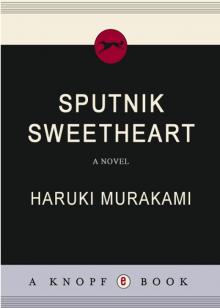 Sputnik Sweetheart
Sputnik Sweetheart Dance Dance Dance
Dance Dance Dance The Wind (1) and Up Bird Chronicle (2)
The Wind (1) and Up Bird Chronicle (2) Blind Willow, Sleeping Woman
Blind Willow, Sleeping Woman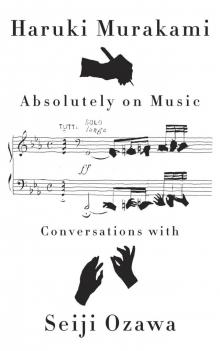 Absolutely on Music: Conversations With Seiji Ozawa
Absolutely on Music: Conversations With Seiji Ozawa Norwegian Wood
Norwegian Wood South of the Border, West of the Sun
South of the Border, West of the Sun Kafka on the Shore
Kafka on the Shore Men Without Women
Men Without Women After Dark
After Dark Hard-Boiled Wonderland and the End of the World
Hard-Boiled Wonderland and the End of the World 1q84
1q84 The Wind-Up Bird Chronicle
The Wind-Up Bird Chronicle Underground: The Tokyo Gas Attack and the Japanese Psyche
Underground: The Tokyo Gas Attack and the Japanese Psyche Vintage Murakami
Vintage Murakami The Elephant Vanishes: Stories
The Elephant Vanishes: Stories Colorless Tsukuru Tazaki and His Years of Pilgrimage
Colorless Tsukuru Tazaki and His Years of Pilgrimage First Person Singular
First Person Singular After the Quake
After the Quake A Wild Sheep Chase
A Wild Sheep Chase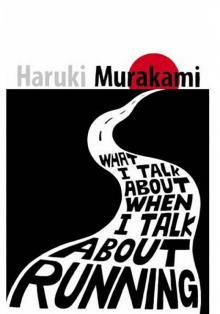 What I Talk About When I Talk About Running
What I Talk About When I Talk About Running Birthday Girl
Birthday Girl The Elephant Vanishes
The Elephant Vanishes Norwegian Wood (Vintage International)
Norwegian Wood (Vintage International) Wind/Pinball
Wind/Pinball Norwegian Wood Vol 1.
Norwegian Wood Vol 1. Underground
Underground Colorless Tsukuru Tazaki and His Years of Pilgrimage: A novel
Colorless Tsukuru Tazaki and His Years of Pilgrimage: A novel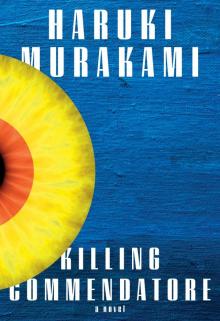 Killing Commendatore
Killing Commendatore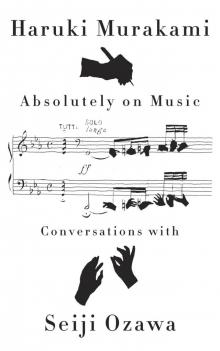 Absolutely on Music
Absolutely on Music